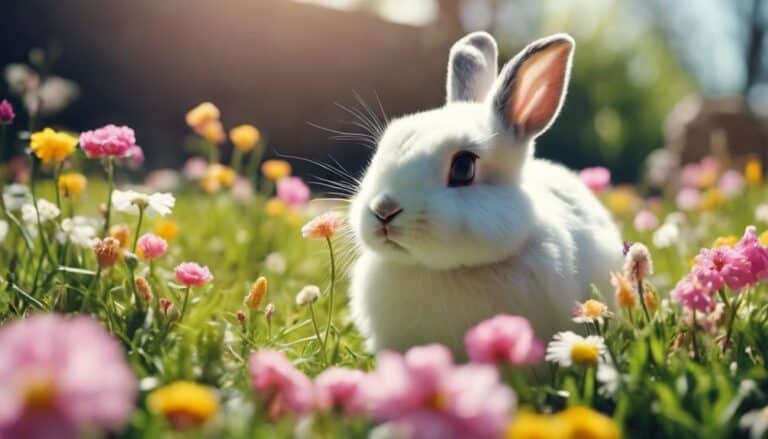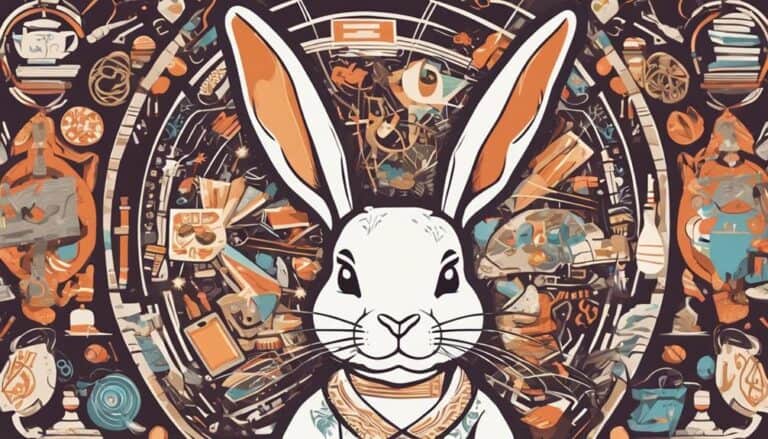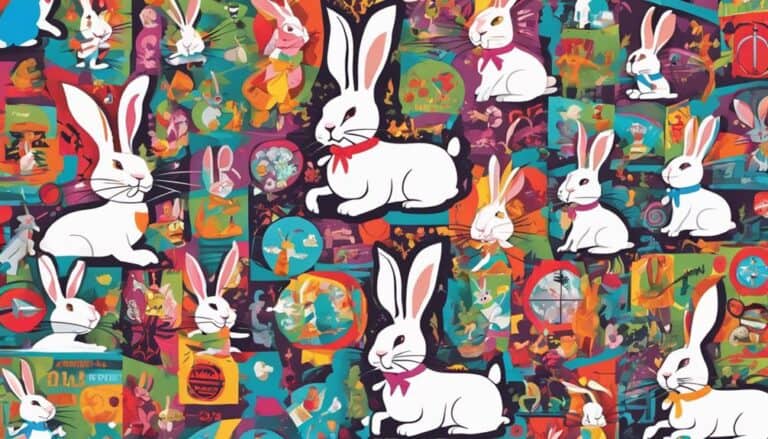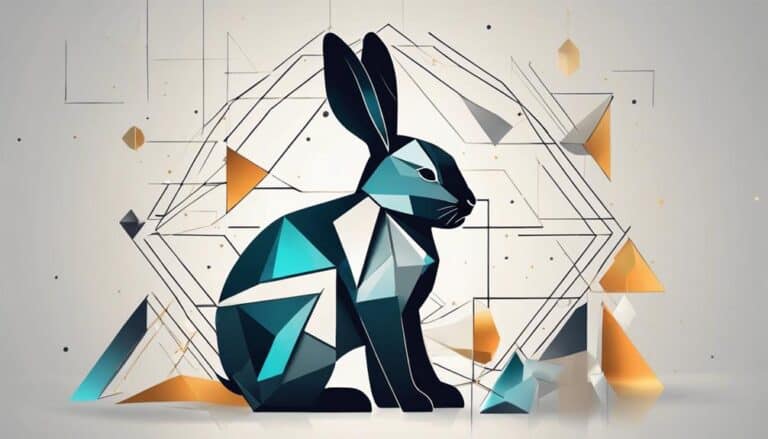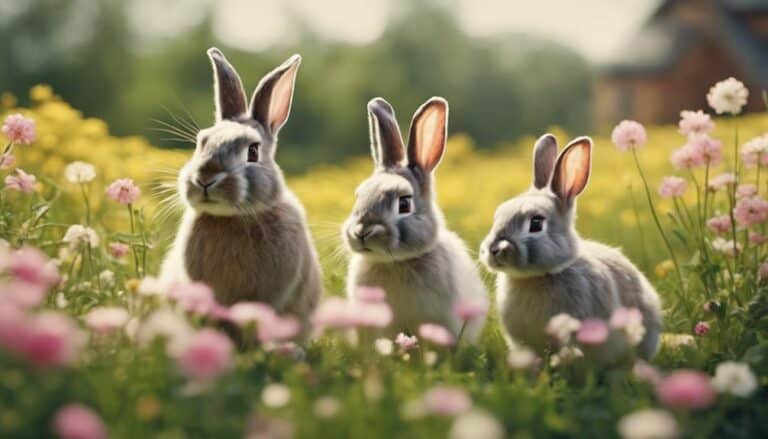When exploring the significance of bunny symbolism, you'll find it to be a vast rabbit hole of cultural richness and profound meanings.
From ancient folklore to modern interpretations, the bunny symbol carries layers of symbolism waiting to be unraveled.
So, why not hop into this exploration and discover the hidden depths of bunny symbolism that have fascinated minds for centuries?
Contents
- 1 Key Takeaways
- 2 Bunny Symbolism in Native American Folklore
- 3 Bunny Symbolism in Ojibwe Culture
- 4 Bunny Symbolism in Southwestern Tribes
- 5 Bunny Symbolism in Cherokee Mythology
- 6 Rabbit Clans in Native American Culture
- 7 Bunny Symbolism in Aztec Mythology
- 8 The Rabbit in the Moon in Native American Folklore
- 9 Hare Mythology in Native American Tribes
- 10 Frequently Asked Questions
- 11 Conclusion
Key Takeaways
- Bunny symbolism embodies wisdom, trickery, and transformative abilities in Native American folklore.
- Bunnies teach lessons on intelligence, resourcefulness, and adaptability in cultural narratives.
- Rabbit symbolism in Southwestern tribes signifies abundance, growth, and renewal within communities.
- Aztec and Moon Rabbit symbolism represent fertility, creativity, and the cyclical nature of life in Native American traditions.
Bunny Symbolism in Native American Folklore

In Native American folklore, bunnies emerge as playful tricksters embodying wit and cleverness, revered for their ability to impart valuable lessons through cunning and resourcefulness. Among the Algonquin tribes, the Rabbit plays a significant role in their legends, often represented by cultural heroes like Nanabozho and Michabo. These rabbit deities symbolize important cultural values and beliefs, serving as a reminder of resilience and adaptability in the face of adversity.
Cherokee folklore also portrays rabbits as tricksters, showcasing their ability to outsmart others and teach essential lessons. The bunny symbolism in Native American folklore transcends mere entertainment, delving into the domains of morality and wisdom. Through the antics of these cunning creatures, individuals are encouraged to reflect on the importance of intellect, quick thinking, and adaptability in navigating life's challenges.
Bunny Symbolism in Ojibwe Culture
In Ojibwe culture, bunnies aren't just ordinary creatures; they hold a significant place intertwined with the legendary figure of Nanabozho. Nanabozho, often depicted as a rabbit, embodies the essence of cunning trickery and wisdom in Ojibwe folklore.
Ojibwe Bunny Mythology
How does Ojibwe Bunny Mythology enrich the cultural tapestry of the Ojibwe people?
Bunny symbolism in Ojibwe culture intertwines with the legendary Nanabozho, a figure embodying both wisdom and trickery.
Within Ojibwe folklore, rabbits are portrayed as tricksters endowed with transformative abilities. The rabbit symbolizes essential traits like cleverness, adaptability, and survival skills, reflecting values vital for handling life's challenges.
Ojibwe stories often showcase the rabbit's prowess in outwitting adversaries and overcoming obstacles, teaching valuable lessons about resilience and wit.
Cultural Bunny Representations
Amidst the rich tapestry of Ojibwe culture, the bunny emerges as a symbol intertwined with wisdom, trickery, and transformative prowess, reflecting essential values for maneuvering life's challenges.
In Ojibwe folklore, the bunny holds significant cultural representations:
- Nanabozho Connection: The bunny is closely associated with Nanabozho, the cultural hero in Ojibwe stories, embodying cleverness and trickster qualities.
- Symbol of Resourcefulness: The bunny symbolizes resourcefulness in sailing the complexities of existence, offering lessons on adaptability and survival.
- Cultural Insights: Through tales featuring the bunny, Ojibwe culture imparts moral teachings and insights into the importance of portraying animal symbolism in traditional narratives.
Spiritual Bunny Connections
Embodied within Ojibwe cultural narratives, the spiritual essence of bunny symbolism transcends mere tales, imparting profound wisdom and cunning insights essential for traveling life's intricate pathways. In Ojibwe culture, the bunny represents Nanabozho, a revered figure known for his cleverness and wisdom.
As a benign trickster figure, the bunny in Ojibwe folklore is celebrated for outsmarting others through its cunning ways. Through these stories, the bunny teaches valuable lessons about traveling challenges with intelligence and resourcefulness. It symbolizes the importance of thinking quickly and adapting to different situations with agility.
Bunnies hold a significant place in Ojibwe cultural beliefs, serving as a reminder of the power of wit and wisdom in overcoming obstacles and achieving success.
Bunny Symbolism in Southwestern Tribes
In Southwestern tribes, the symbolism of bunnies extends beyond mere animals to represent fertility, rainfall, and prosperity. The significance of bunnies in these cultures goes deeper, embodying profound meanings that resonate with the core values of the community.
- Fertility: Bunnies are revered for their association with fertility, symbolizing the ability to create new life and sustain future generations within the tribe.
- Abundance and Growth: The presence of bunnies signifies abundance and growth, indicating a period of prosperity and flourishing within the community.
- Renewal and New Life: In Southwestern tribes, the bunny embodies the essence of renewal and new life, signifying a fresh start and the cyclical nature of existence.
The rabbit's symbolism in these tribes reflects a deep-rooted connection to the land, the cycles of nature, and the importance of prosperity and abundance in fostering a thriving community. Embracing the bunny's symbolism brings forth a sense of hope, renewal, and the promise of a prosperous future.
Bunny Symbolism in Cherokee Mythology
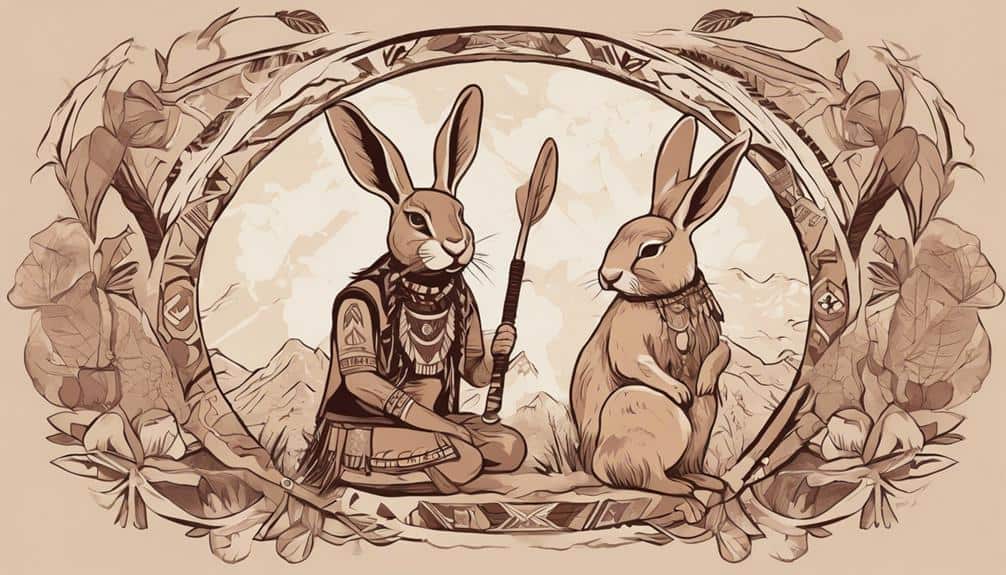
In Cherokee mythology, the rabbit embodies the role of a trickster, using its cunning to convey essential wisdom. Through outsmarting formidable creatures like the bear and the wolf, the rabbit showcases its intelligence and quick wit.
Cherokee stories featuring the rabbit highlight the importance of cleverness and strategic thinking in overcoming life's challenges.
Cherokee Bunny Stories
Within Cherokee folklore, the tales of the cunning bunny reveal profound insights into intelligence and adaptability. The Cherokee bunny stories depict the bunny as a symbol of resourcefulness, quick thinking, and cleverness. Through these narratives, the bunny teaches valuable lessons about overcoming challenges and outsmarting adversaries.
Here are three key takeaways from Cherokee bunny stories:
- Adaptability: The bunny adapts to various situations by using its wit and cunning to navigate obstacles.
- Intelligence: These stories highlight the intelligence of the bunny in finding unique solutions to problems and achieving its goals.
- Resourcefulness: The bunny exemplifies resourcefulness by using its creativity and quick thinking to outwit others in Cherokee folklore.
Bunny as Trickster
With its cunning nature and clever tactics, the bunny emerges as a revered trickster figure in Cherokee mythology, symbolizing wit and intelligence in maneuvering life's challenges.
In Cherokee folklore, the bunny is portrayed as a crafty character known for outsmarting others through its quick thinking and resourcefulness. Through stories passed down in Cherokee culture, the bunny showcases its ability to use clever tactics to achieve its goals, often teaching moral lessons along the way.
The bunny's role as a trickster in Cherokee mythology not only entertains but also serves as a reflection of the Cherokee people's appreciation for wit and intelligence in negotiating the complexities of life. Embracing the bunny's cunning ways, Cherokee tales highlight the importance of cleverness in overcoming obstacles and achieving success.
Rabbit Clans in Native American Culture
Deeply ingrained in the fabric of Native American cultures are Rabbit Clans, symbolizing maternal family ties and ancestral guardianship. Within these cultures, the Rabbit holds significant symbolism beyond its physical attributes.
Here are three profound insights into the significance of Rabbit Clans in Native American Culture:
- Maternal Family Lines: Rabbit Clans in tribes like the Hopi and Shawnee trace their lineage through the maternal line, emphasizing the importance of matriarchy and maternal ties in these societies.
- Animal Guardianship: Each clan in Native American cultures is linked to a specific animal guardian, with the Rabbit Clan taking on the responsibility of embodying traits associated with fertility, prosperity, and rainfall, particularly in Southwestern tribes.
- Cultural Traditions: The Rabbit Dance, a sacred ritual observed by Northeastern and Northern Plains tribes, serves as a ceremonial expression of gratitude towards the Rabbit for its symbolic significance in their culture.
Bunny Symbolism in Aztec Mythology

Rabbit Clans in Native American cultures offer a gateway to understanding the profound significance of Bunny Symbolism in Aztec Mythology. In Aztec mythology, rabbits hold a multifaceted symbolism, representing fertility, indulgence, and celebrations. The Centzon Totochtin, a group of 400 rabbit gods, embody the festive spirit and abundance associated with these creatures.
Among them, Macuiltochtli reigns over indulgence and the repercussions of excess, serving as a cautionary tale intertwined with the revelry of parties. One of the most renowned Aztec legends recounts how a rabbit ended up on the moon, involving the deity Quetzalcoatl and the noble sacrifice of the rabbit.
This tale not only highlights themes of selflessness and honor but also adds layers to the intricate tapestry of Aztec mythology, showcasing the diverse roles rabbits play in the cultural and spiritual landscape of ancient Mesoamerica. The presence of rabbits in Aztec myths underscores their significance as symbols of life, abundance, and the cyclical nature of existence.
The Rabbit in the Moon in Native American Folklore
In Native American folklore, the luminous presence of the moon harbors within it a profound symbol – the Rabbit in the Moon, embodying a tapestry of creativity, fertility, and abundance. The cultural interpretations surrounding the Rabbit in the Moon are rich and varied, shedding light on the significance it holds within different Native American tribes.
- The Rabbit in the Moon symbolizes creativity, inspiring individuals to embrace their imaginative powers and bring forth new ideas and innovations.
- Fertility is another key aspect associated with the Rabbit in the Moon, representing the cycles of life, growth, and nourishment present in the natural world.
- The theme of abundance linked to the Rabbit in the Moon signifies not only material wealth but also spiritual richness, encouraging individuals to seek fulfillment beyond material possessions.
The Rabbit in the Moon, with its deep-rooted symbolism in Native American folklore, serves as a guiding light, offering wisdom and connection to the spiritual kingdom for those who gaze upon its radiant form.
Hare Mythology in Native American Tribes
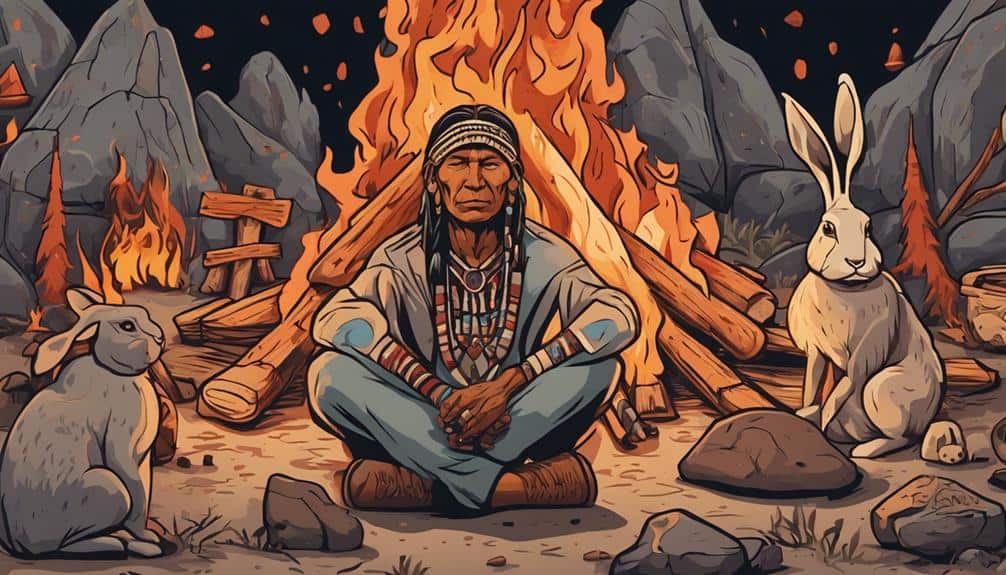
Exploring the intricate tapestry of Hare Mythology in various Native American tribes reveals a complex web of cultural significance and symbolic representation woven into their folklore. The rabbit or hare holds a special place in Native American traditions, often depicted as a benign trickster figure imparting valuable lessons. In Ojibwe culture, the rabbit is associated with Nanabozho, a cultural hero known for his cunning ways and transformative adventures. Among the Algonquin tribes, deities like Nanabozho and Michabo embody the essence of the rabbit in their legends, symbolizing cleverness and adaptability.
Southwestern tribes view the rabbit as a symbol of fertility, rainfall, and prosperity, attributing mystical qualities to this creature. Cherokee folklore also portrays the rabbit as a trickster figure, using wit and humor to teach important moral lessons to tribe members. Across various Native American tribes, the rabbit's presence in folklore showcases its multifaceted symbolism, representing not only trickery and cunning but also fertility, prosperity, and cultural wisdom.
Frequently Asked Questions
What Does the Bunny Symbolize Spiritually?
In spiritual dimensions, the bunny symbolizes inner peace, a fertility symbol, innocence lost, spiritual growth, divine connection, a rebirth metaphor, and symbolic transformation. Embrace these teachings to align with the universe and foster personal growth.
What Is a Bunny a Symbol Of?
Bunnies symbolize fertility, abundance, innocence, purity, playfulness, joy, luck, prosperity, rebirth, renewal, gentleness, kindness, and cuteness. Their essence embodies qualities that inspire and uplift, reminding you of the beauty in simplicity and life's blessings.
What Do Bunnies Symbolize in Us?
In you, bunnies symbolize cultural meanings, personal connections, emotional representation, historical interpretations, psychological associations, artistic representations, and folklore significance. Their presence subtly influences your life, guiding you towards compassion and new beginnings.
Why Are Bunnies Good Omens?
You wonder why bunnies are good omens. Well, they are luck charms, fertility symbols, and positive energy bearers. Innocence representation, joy bringers, abundance symbols, and hope carriers. Their presence heralds blessings and opportunities.
Conclusion
As you reflect on the significance of bunny symbolism across various cultures, remember the adage: 'In every walk with nature, one receives far more than he seeks.'
The gentle and compassionate nature of bunnies serves as a reminder to embrace empathy, creativity, and renewal in your own life.
Through the symbolism of rabbits, we're encouraged to approach situations with caution and care, embodying traits of agility, playfulness, and wisdom.
Embrace the messages of protection, joy, and self-awareness that bunny symbolism conveys.

